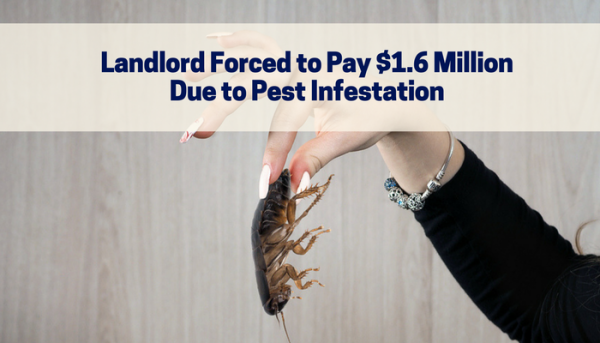
Recently, a civil jury awarded a family scarred by bedbugs $1.6 million–the highest amount ever paid to a single family in a bed bug case in the United States, according to the family’s lawyer.
In 2012, the Martinez family–living in an apartment in Inglewood, California–began noticing red spots all over their three-year-old’s body and face. After taking him to the hospital, the family was told that the spots were not the result of a viral illness, but caused instead by bug bites.
After searching the house for pests, the family discovered bed bugs were present. Additionally, bites were found on their then 3-month-old daughter, according to their mother Lilliana Martinez.
That year, the management sent someone to fumigate the apartment, and when the family continued to be bitten, the company eventually responded after 4 months, removing the carpeting which helped to finally end the infestation.
According to the New York Times, the family sued their apartment complex in 2014 “for breach of warranty of habitability, emotional distress, negligence and breach of contract, among other charges.”
Here is what landlords and property managers can take from this high-profile case.
Pest Infestations Are More Than Just a Nuisance:
Pests are aptly named. Pesky and annoying, there is no doubt that the creepy crawlies and scurrying rodents are indeed a nuisance. However, when it comes to managing a property, a pest infestation can be much more than a mild inconvenience. Since landlords and property managers legally are responsible for providing tenants with safe and livable home (most states refer to this as the implied warranty of habitability) pests can become an issue of habitability. And while state and local laws may vary on the specifics of habitability, this will likely include clean and sanitary conditions.
It’s Crucial to Address (and Re-address) Maintenance Issues Promptly:
Don’t make the mistake of waiting on a maintenance issue that needs to be addressed. Deferring maintenance can risk further damage to your property, conveys a lack of customer service and support to your tenants, and–in issues where the livability of the space is compromised–can compromise the health and safety of your tenants and lead to litigation. Make it easy for tenants to report any maintenance issues, and respond to them in a timely manner. Moreover, if a maintenance issue has been addressed already but the tenant is reporting that problem is still present, don’t wait to provide a better solution and additional support. Remember, having these issues and fixes documented can be used as proof that you did your due diligence should you ever be faced with a legal battle.
Regular Inspections are Key:
In-person property inspections are your only assurance that the property is damage-free and being well-maintained by your tenants. It’s never enough to rely on the untrained eye of your tenants to evaluate and report potential hazards to the property. Regularly conduct seasonal inspections, and use this time to ensure that there are no maintenance issues that could cost you down the road if they are not addressed. Take a moment throughout your inspection to address the cleanliness of your tenants as well, reminding them about simple pest-prevention techniques that can mitigate the risk of a pest infestation.
Have a Plan for the Worst-Case Scenario:
State laws vary on how landlords and managers must address issues of habitability for tenants. Be certain you know the ins-and-outs of your local and state requirements in circumstances regarding pests and other issues.
Should your property become unlivable for a period of time, you may be faced with one of the following options:
- Required to pay for your tenants living accommodations until the property is once-again ready
- Required to allow your tenants to stop making rent payments until the property is liveable
- Required to allow your tenants to break their lease without repercussions
Know precisely what your management team’s policies will be should a unique habitability issue arise. Consider evaluating this policy with a lawyer to ensure that you are sufficiently providing for your tenants in accordance with your state’s laws.
Overall, remember to address any problems with promptness and compassion. A little caring can go a long way to remind your tenants that you’re a great team to work with and that you care about their experience when living on your rental property.